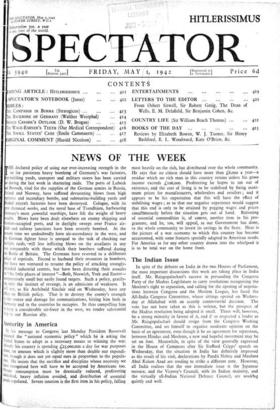Austerity in America
In his message to Congress last Monday President Roosevelt outlined the "national economic policy" which he is asking the United States to adopt as a necessary means to winning the war. Already his country is spending £25,000,000 a day for war purposes alone, an amount which is slightly more than double our expendi- llue, though it does not yet equal ours in proportion to the popula- ,1". He insists that the sacrifice and discipline whose necessity we nave recognised here will have to be accepted by Americans too. Private consumption must be drastically reduced, profiteering abolished, heavy inflation avoided, and distribution of essential foods regulated. Severe taxation is the first item in his policy, falling
most heavily on the rich, but distributed over the whole community. He says that no citizen should have more than £6,000 a year—a residue which no rich man in this country retains unless his gross income exceeds £io6,000. Profiteering he hopes to tax out of existence, and the cost of living is to be stabilised by fixing maxi- mum prices for manufacturers, wholesalers and retailers ; and it appears to be his expectation that this will have the effect of stabilising wages ; as to that our negative experience would suggest that this end is only to be attained by pegging wages and prices simultaneously before the situation gets out of hand. Rationing of essential commodities is, of course, another item in his pro- gramme, and he, too, will appeal, as our Government has done, to the whole community to invest its savings in the State. Here is the picture of a war economy to which this country has become accustomed, with some features specially adapted to American needs. For America as for any other country drawn into the whirlpool it is to be total war on the home front.


























